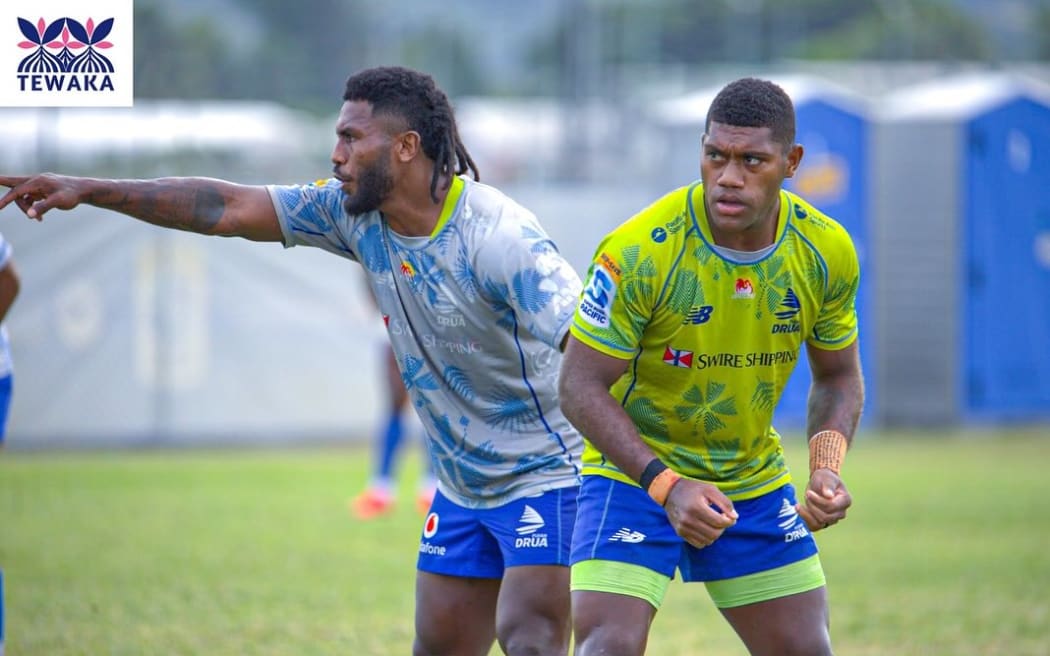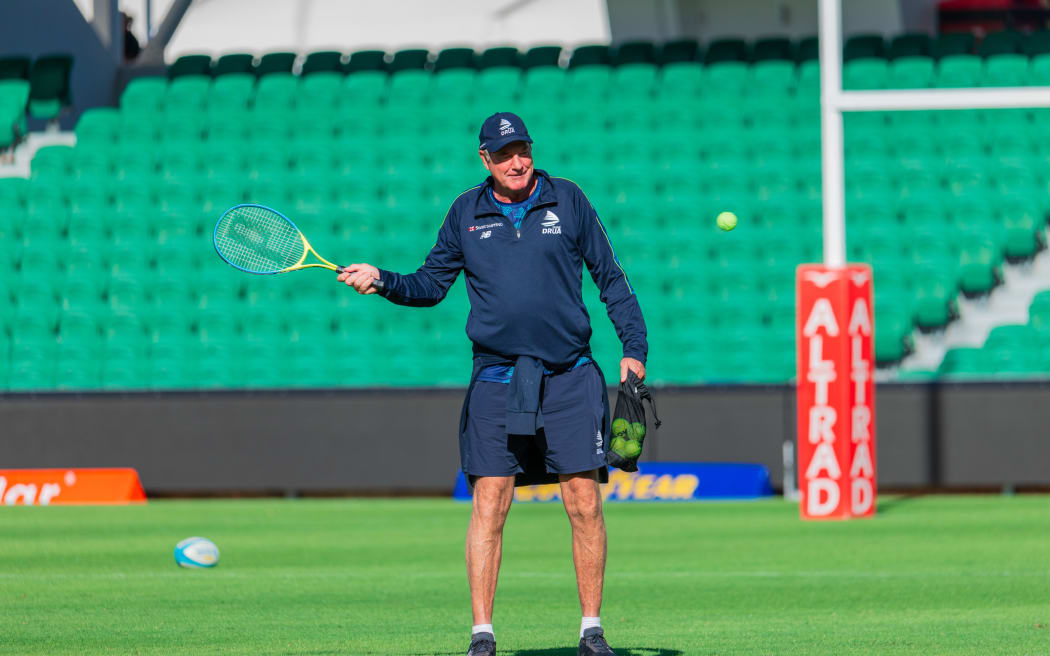Frank Boivert, a former coaching director of the Fiji Rugby Union (FRU), feels that the Fijian Drua team has grown too dependable.
Frank Boivert, a former coaching director of the Fiji Rugby Union (FRU), feels that the Fijian Drua team has grown too dependable.
Boivert, who oversaw the rugby program at the University of the South Pacific in Suva in the 1990s and coached the American national women’s team to two world cups, claimed that most Super Rugby Pacific sides they have faced thus far have neutralized the Drua attacks early on.
According to the Frenchman, the Drua side has to start using their Fijian flair again and incorporate their scrumhalf, flyhalf, and fullback in more “creative plays.”
In rugby, it’s important to keep the opposition guessing. The defense would have an extremely simple time handling your attack if it is predictable,” he told RNZ Pacific.
According to him, the scrumhalf will draw defenders or watchdogs if they run the ball from ruck situations or use the blindside. They can then commit to supporting players who can hit the holes and produce overlaps.
“It seems to me that the Drua team are just too predictable by running straight into the defence, instead of using the formidable weapon of Fijians, that is the inside step and the offload in the space,” he stated.
In the recent games against the Hurricanes and the Western Force, the opposition has essentially been gang-tackleing the receiver after he sprints and strikes the defensive wall. Then, for hanging on, he suffers consequences.”
Another crucial error, according to Boivert, that the Drua ball carriers are making is collapsing to the ground instead of getting back up to continue moving ahead once they contact the defense wall.
He advised against rucks unless it is “really necessary for them to do that” for the team.
If there is a set-up on the ground, their other option is to get the ball out right away.
“When I was with Nadroga we were avoiding the rucks at all cost as for us a ruck was an accident of the game, like we say in France,” he stated.
He had also spent years supporting Nadroga Rugby in the Fijian league.
“So, unlike the terrible majority of teams in Fiji these days, we were playing on our feet and not ‘davo,’ or going to ground. Returning to the ruck game, which is incredibly predictable, the defenses are simply too well-prepared.”
He suggested that the Drua scrum-halves, or halfbacks, should learn from French halfback Antoine Dupont.
“He takes a few step just to hold the watchdog and then passes the ball, respecting the basic of rugby that we teach all our players, that is you must first fix a defender before passing the ball,” he stated.
“Fijian scrumhalf stereotypes are simply too strong. They simply pass the ball back and forth.
“They ought to sprint and never stop pushing the periphery. And on the blindside, they have to run with the ball.”
According to Boivert, one of the team’s most important weapons that isn’t being used is the counterattacking strategy.
Selesitino Ravutaumada, a winger, would be better suited as fullback, in his opinion, so he can initiate counterattacks from kicked balls.
However, the counterattacker needs to know when to retreat rather than flee from players providing support.
“The player who is receiving the ball must be aware of his teammates’ locations as well as the space available.
“Fijian players are fantastic counter-attackers and therefore the team must capitalise on that and use those fantastic qualities.”
According to him, players need to be able to recognize when there is a chance for overlap and adjust their defense accordingly.
He brought attention to the opening Western Force try from last week in Perth, when the team’s first try came from winger Chase Tiatia three minutes in.
“Those Drua players don’t know how to defend.” “They fail to identify instances of overlap,” he remarked.
Because they were keeping square and not playing inside-out, where they are turned towards the anticipated overlap player, the players in that play went to the ball carrier rather than playing inside-out defense.
“And another big issue is that the last Drua defender does not stay on the last attacking player, not marking his man.”
If the Drua team fixes the errors he has pointed out, he believes they can defeat the Reds.
The number eight is supposed to create play by selecting from the base of the scrums following the second scrum push, according to Boivert, who praised the team’s scrum efforts and said that they should also use them as a platform to achieve an advantage.
“When they go for a second push that will commit the opposition’s loose forwards, who will not be able to run so the number eight can hit the advantage line with the ball and set up attacks from that,” he stated.
Mick Byrne, the head coach of the Fijian Drua, told the media on Tuesday that his team made a mistake against the Force and that they now need to win their final three games to have a chance of finishing in the top eight.
He stated that the Reds in Suva on Saturday should be the first to do that.
“What we know about a full team competition top eight, you can have a couple of slipups,” Byrne stated.
“We cannot make the same mistakes twice. We made a mistake last Saturday, but we managed to get through and are currently in the eighth.
“You just need to be cautious because if we win our next three and we keep winning, everything will work out. Now that we’re at eight, we have complete control. We simply need to keep winning because, as I say, the future is in our hands.”
Reds will be difficult to beat, according to Byrne.
Due to an injury, top number eight David Wilson will not be available for the visitors.
“They are a good side, they’ve their physical side there, their defense is very good, they come hard at you,” he stated.
Additionally, they exert a great deal of pressure on the ball and breakdowns, both on the ground and in the air. We just must be extremely physical when it comes to our mistakes and take good care of the ball if we want to start winning.
“And we’ll get quick balls and we’ll move around and we’ll try and move the Reds pack around the field.”
According to Byrne, players had the chance to evaluate their game during the lengthy journey back from Perth to Nadi earlier this week.
He claimed they have been concentrating on the Reds game and are prepared for the match.
“We just got to make sure that we are ready to play what whatever team the Reds bring here, and they’re going to be physical and we know that so I’m looking forward to that clash,” he stated.
“Monday was really upsetting, because the trip back from Perth was lengthy—we had to get up at 4:30 a.m. there.
“And we flew here till it was nine o’clock at night. Though it’s regrettable what happened on Saturday night, the group had a good, honest chat when we arrived on Monday. The major test will be how we react.
“Some males in the camp are furious. We should be able to react on Saturday, I believe.
For Drua to maintain their ninth place, they must win.
The Perth-based squad will move up to number eight and Drua would drop to number nine if they lose and Western Force wins.
Byrne does not want to see it since he knows it will be a much difficult task for them to overcome if they end up in that circumstance.
On Saturday, the Fijian Drua vs. Reds game begins at 2:05 p.m. (Fijian and New Zealand time).



Leave a Reply